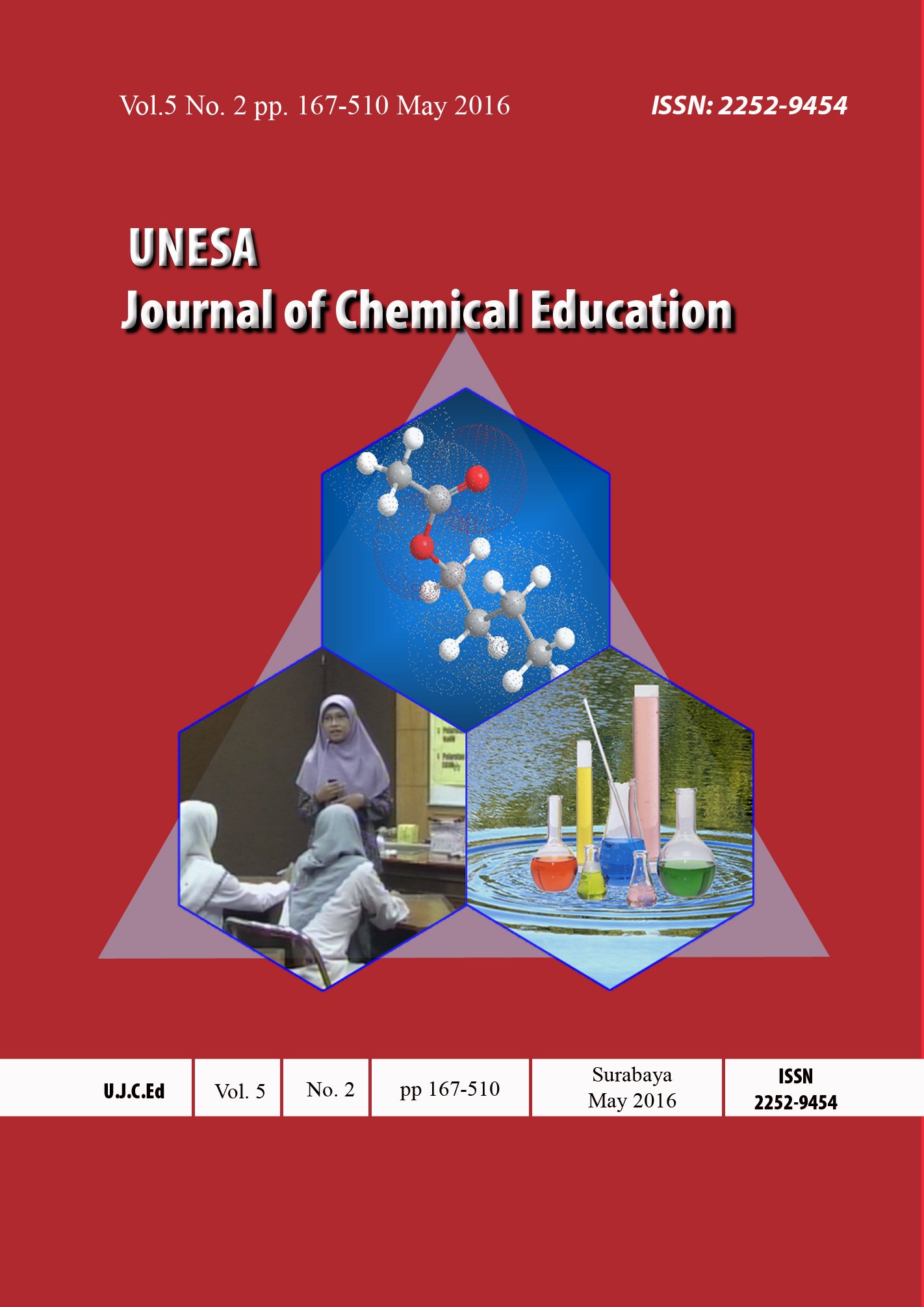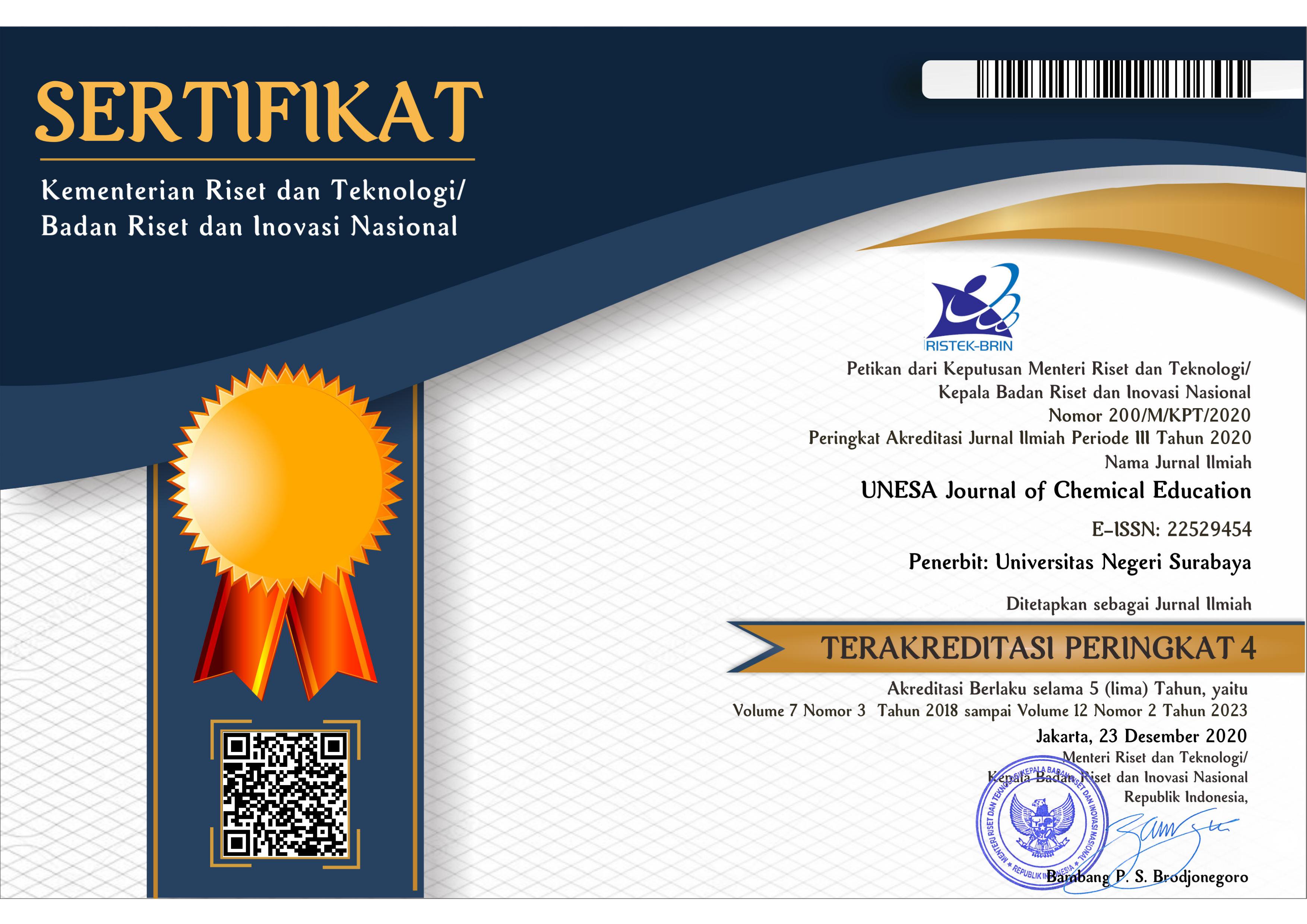PENGEMBANGAN BUKU AJAR BERORIENTASI PROBLEM SOLVING PADA MATERI LARUTAN ELEKTROLIT DAN NON-ELEKTROLIT UNTUK SISWA SMK (THE DEVELOPMENT OF TEXTBOOK ORIENTED PROBLEM SOLVING IN ELECTROLYTE AND NON-ELECTROLYTE TOPIC FOR STUDENTS SMK)
Abstract
Penelitian ini bertujuan mengetahui kelayakan buku ajar kimia berorientasi problem solving untuk melatih keterampilan pemecahan masalah pada materi elektrolit dan non elektrolit, secara teoritis melalaui hasil validasi dan secara empiris melalui respon siswa terhadap buku yang didukung oleh hasil observasi, tes pengetahuan dan tes keterampilan pemecahan masalah. Penelitian ini menggunakan pengembangan desain 4-D (define, design, develop, disseminate), penelitian ini terbatas sampai tahap develop. Analisis data dilakukan secara deskriptif kuantitatif untuk mengetahui kelayakan buku secara teoritis dan empiris. Hasil penelitian menunjukkan buku yang dikembangkan layak, baik secara teoritis dan maupun secara empiris dan teoritis, ditinjau dari kriteria isi, kebahasaan, sajian dan kegrafikan memperoleh persentase kelayakan berturut-turut sebesar 79,16%, 92,70%, 88,33%, 82,40% dan 84,72%. Secara empiris, buku memperoleh respon positif dari siswa dengan persentase kelayakan untuk masing-masing kriteria yaitu kriteria isi, kebahasaan, sajian dan kegrafikan lebih besar dari 61% yang didukung respon siswa 87,54%, hasil observasi selama tahap uji coba buku dengan persentase sebesar 72,26%, ketuntasan klasikal pengetahuan setelah uji coba buku dengan persentase sebesar 71,88% dan keterampilan pemecahan masalah sebesar 73,26%. Hasil ini menunjukkan bahwa buku ajar berorientasi problem solving layak digunakan.
Kata kunci: Buku Ajar, problem solving, Elektrolit dan Non Elektrolit.
The aim of this research is to know feasibility of chemistry textbook oriented problem solving to practice problem solving skills of electrolyte and non-electrolyte solutions topic the results of validation and empirically the result student responses to the book that is supported by the results of observations, ability tests and test problem-solving skills ( problem solving). This research of development used design 4-D (define, design, develop, disseminate), that is limited until develop stage. Data analysis to method quantitative deskriptif used to know feasibility of textbook theoritically and empirically. The results show the textbook, is feasible theoretically and empirically. Theoretically, by the content, linguistic, presentation and graphic, criteria respectively show percentage results around to 79.16%, 92.70%, 88.33%, 82.40% and 84.72%. Empirically, the book gained a positive response from students are percentage of eachs criteria: content, language, serving and graphic more than 61%, which is supported by respon of studies 87,54%, observation results of while the test shows percentage 72.26%, classical exhautiveness of ability after the used of the book shows with a percentage of 71.88% and problem solving skills gets 73.26%. These mean that the textbook oriented problem solving to use feasible.
Keywords: Textbooks, Problem Solving, Electrolyte And Nonelectrolyte
 Abstract Views: 24
Abstract Views: 24 PDF Downloads: 41
PDF Downloads: 41










